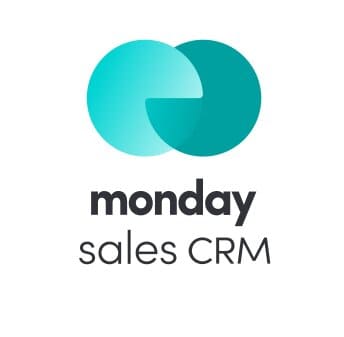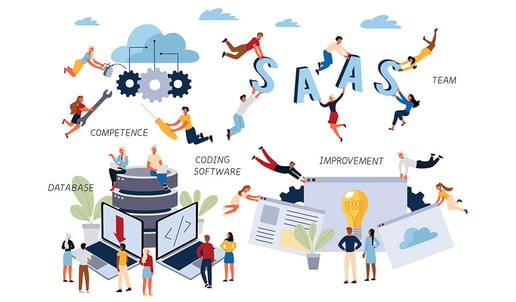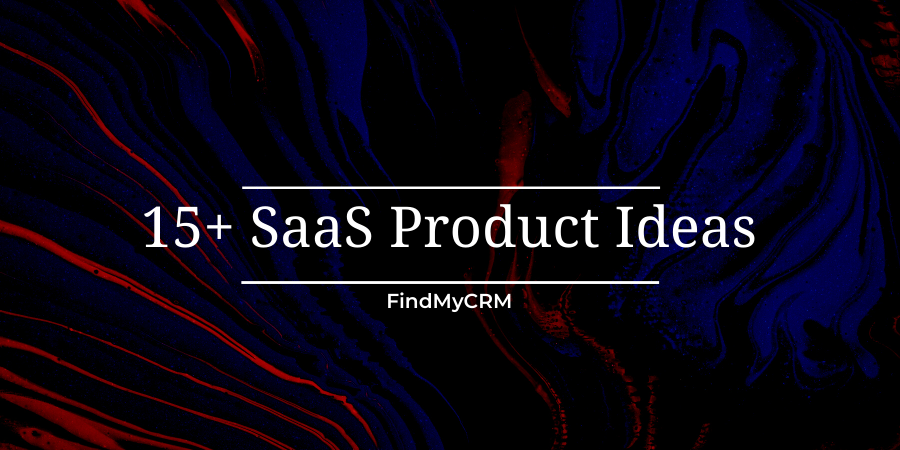You may have noticed that SaaS has consistently ranked as one of the best business models for several years now. It's no wonder that SaaS startups have reached incredible levels of success. This model has been embraced by industry giants like Google, Apple, IBM, Adobe, as well as smaller companies. In this article, we will delve into the experiences of building a SaaS business and explore SaaS product ideas based on successful existing services.
Download Now: Free "15+ SaaS Product Ideas" eBook
What Is A Saas Business?

To start off, let's cover the fundamentals before we dive into the most effective trading ideas. The Software-as-a-Service (SaaS) business offers an online platform that grants users subscription-based access to its features, support, and technical services. Typically, users can conveniently access the software remotely. This remote accessibility is one of the key advantages of SaaS, as it allows businesses to easily manage their operations without the need for physical infrastructure or on-site installations.
With SaaS, businesses can enjoy the flexibility of accessing their software and data from anywhere with an internet connection. This means that employees can work remotely, collaborate with team members in different locations, and access important information on the go. It also eliminates the need for businesses to invest in expensive hardware and IT infrastructure, as all the necessary resources are hosted and managed by the SaaS provider.
When choosing a SaaS CRM software for your business, it's important to consider factors such as overall rating, ease of use, user adoption, robust reporting, and deep customizations. To help you make an informed decision, we have compared and ranked the top 8 CRMs for SaaS businesses based on these factors. Salesforce, with its high overall rating and robust features, emerges as the best overall CRM for SaaS businesses. However, other options like monday and HubSpot excel in specific areas such as workflows and marketing automation.
In addition to CRM software, there are many other SaaS product ideas that businesses can explore. For example, becoming a SaaS software developer allows you to create and provide software applications on a subscription basis. You can also consider launching a data integration platform that simplifies and streamlines the process of integrating data from multiple sources. Another option is to build a universal payment gateway that supports various payment methods and provides secure transactions for online businesses.
Overall, the SaaS business model offers immense opportunities for innovation and growth. By leveraging the power of cloud computing and subscription-based services, businesses can benefit from cost savings, flexibility, and scalability. Whether it's CRM software, web hosting, or cloud security, there are numerous SaaS product ideas that can cater to the diverse needs of businesses and customers. The key is to identify a niche and provide a solution that adds value and improves efficiency for your target audience.
SaaS CRM software is a cloud-based customer relationship management solution that allows businesses to access and manage customer data, sales information, and marketing automation tools from anywhere with an internet connection, making it an efficient and flexible solution for modern businesses.
Compare our Top 8 CRMs for SaaS Business:
| CRM | Overall rating | Ease of Use | User Adoption | Robust Reporting | Deep Customizations |
| monday | 4.1 | 4.5 | 4.5 | 3.5 | 3.5 |
| Salesforce | 4.4 | 4.0 | 4.4 | 4.9 | 4.7 |
| Capsule | 4.0 | 4.6 | 4.6 | 3.5 | 3.5 |
| Freshsales | 4.3 | 4.5 | 4.4 | 4.2 | 42 |
| Pipedrive | 4.2 | 4.6 | 4.7 | 4.0 | 3.5 |
| HubSpot | 4.9 | 4.8 | 4.9 | 4.8 | 4.9 |
| Zoho | 3.8 | 3.2 | 3.0 | 3.2 | 2.0 |
| Act! | 3.6 | 3.7 | 3.8 | 3.5 | 3.5 |
In this case, the software goes beyond being just a product. The company takes on the responsibility of maintaining the databases, servers, and additional software to ensure smooth functionality over time. Subscribed members can expect ongoing services from the company, including regular updates and improvements to the software.
By offering ongoing maintenance and support, the company aims to provide a hassle-free experience for its customers. They understand that technology is constantly evolving, and therefore, they proactively work towards keeping the software up-to-date with the latest advancements. This includes addressing any bugs or issues that may arise, as well as implementing new features and functionalities based on customer feedback and market trends.
Overall, by offering ongoing services and support, the company aims to build long-term relationships with its customers. They understand that their success is directly tied to the success of their customers, and therefore, they strive to provide exceptional value and service at every step of the way.
The pricing and details of the subscription vary based on factors such as the number of users with profile access (single or team plans), the level of SaaS customer support, the amount of data stored, and the availability of additional services.
Best Overall
Salesforce
If you want to sell smarter and close more deals, Salesforce is the #1 CRM to consider.
Go to siteBest Workflows
Best for Marketing
What are the key components of a SaaS business model?
Understanding the foundation of successful SaaS business ideas is essential. Key components include:
- Subscription pricing generates steady, predictable revenue through monthly, annual, or usage-based subscriptions.
- Cloud-based delivery offers seamless access via the Internet, eliminating the need for local installations and enabling easy scalability.
- Effective customer acquisition and retention strategies are crucial, utilizing robust marketing and sales techniques to attract new users while focusing on excellent customer service to maintain them.
- Continuous product development is necessary to keep your offering relevant and competitive, requiring regular updates, bug fixes, and new features based on user feedback.
- Data security and compliance are vital to protect customer data and comply with regulations like GDPR and HIPAA, which help build trust and avoid legal issues.
- Scalability and performance ensure your infrastructure can handle growth without compromising service quality.
- Top-notch customer support enhances user satisfaction and retention.
What are the benefits of starting a SaaS business?

The SaaS market allows businesses to scale and grow while keeping customers happy. Let's explore the main benefits of cloud-based solutions, which can help entrepreneurs turn their SaaS product ideas into profitable ventures.
Better Business Agility
Business agility refers to a company's ability to adapt quickly to changes in the market. The SaaS industry is renowned for its cost-effectiveness and efficiency improvements. With subscription-based software, companies can use what they need and switch providers if necessary, eliminating the hassle of software updates and maintenance. This allows businesses to focus on productivity and stand out in a competitive market.
Improved Scalability
One of the most frequently mentioned advantages of cloud-based solutions is their scalability. SaaS applications enable businesses to scale operations in line with growth. The elasticity of cloud computing resources allows for strategic and tactical resource allocation. Improved on-demand scalability in SaaS reduces product-related costs. Proper planning transforms innovative startup ideas into profitable products.
Location Independence
Developing SaaS applications allows you to target any audience, depending on your resources, without relying on traditional methods. The SaaS model enables you to hire talent from anywhere in the world with internet access. These professionals can work remotely, eliminating the need for a physical office. Many SaaS companies, such as Zapier, Hubstaff, Buffer, and Basecamp, operate entirely remotely, demonstrating the model's effectiveness.
Where to start if I want to create a micro SaaS product
Creating a micro SaaS product involves several strategic steps. Start by identifying a niche market, focusing on a specific, underserved segment or problem. Conduct thorough market research to validate demand and understand the competition. Define your value proposition clearly, articulating the unique value your product offers and ensuring it addresses a real need with a compelling solution.
Develop a minimum viable product (MVP), beginning with a simplified version to test your concept with real users and gather feedback. Choose the right technology stack, selecting tools and technologies that offer ease of use, scalability, and cost-efficiency. Set up the necessary cloud-based infrastructure for hosting and deploying your application.
Implement reliable payment systems to handle subscriptions and billing, supporting multiple payment methods and currencies if targeting a global audience. Last but not least, launch your SaaS to beta testers, use their feedback to improve, and then release the product to a broader audience.
Powerful CRM System

4.7
What are the challenges and risks of running a SaaS business?
Running SaaS business ideas comes with its own set of challenges and risks:
- Customer acquisition costs: Attracting new customers can be expensive, especially in competitive markets.
- Churn rate: High churn rates indicate dissatisfaction and lead to revenue loss. Focus on customer engagement and support to minimize churn.
- Data security: Protect sensitive customer data to avoid financial and reputational damage. Compliance with data protection regulations is crucial.
- Technical debt: Manage the accumulation of quick fixes and shortcuts to maintain long-term product stability.
- Market competition: Stay ahead with continuous innovation, marketing efforts, and new features and technology investments.
- Customer expectations: Meet high expectations for availability, performance, and regular updates.
Top 20 SaaS profitable product ideas in 2024

Software as a service primarily operates in the B2B realm, connecting business owners to valuable tools that enhance their performance. While B2C products are rare, they do exist.
If you're feeling uninspired and don't know where to start, we've got you covered with some helpful tips. These suggestions might just be the motivation you need.
Micro-SaaS ☁️
Time is valuable, and micro-SaaS solutions can help users save both time and money. The micro-SaaS ideas involve creating a smaller version of an existing SaaS product. Essentially, you take traditional SaaS business platforms and significantly reduce their size until they become "micro."
This strategy for SaaS startups is both cost-effective and scalable. If your initial product takes more than 6-8 weeks to develop, it's time to rethink your micro-SaaS concept.
Micro-SaaS products fill gaps by offering features that are missing or removing unnecessary ones, all for a reasonable price. In a competitive market, micro-SaaS businesses target specific niches or solve particular problems, making them excellent startup ideas.
E-learning & Training Platform 🎓
The digital age requires sophisticated e-learning solutions. A robust SaaS platform that includes interactive content, customized learning pathways, and real-time assessments could revolutionize education's future.
This type of platform accommodates various learning preferences, providing both educators and students with a captivating and engaging experience.
NFT Marketplace Builder🖼️
Today, NFTs (non-fungible tokens) are becoming increasingly popular, with some selling for millions of dollars. Therefore, a promising SaaS product idea for 2024 is to develop an NFT marketplace platform.
An NFT is a data unit that represents a digital version of any unique item, such as paintings, photos, videos, music, and gifs. Essentially, any content with some level of uniqueness can fit this business model.
Creating an NFT SaaS marketplace can support artists and promote lesser-known creators. Additionally, the platform itself can foster the development of new and unique tech solutions for the business. This makes it one of the top SaaS ideas.
Investment Management Tools 💸
After the pandemic, many people have come to understand the importance of investing as a way to safeguard their finances against inflation. However, a common challenge for investors is determining whether a company's current valuation is a good deal. Therefore, one of the most profitable SaaS ideas for 2024 lies in the investment sector.
Stock market valuation apps assist in forecasting growth rates, risk-free rates, and dividends. This allows traders and investors to review past trades and enhance their future strategies. The accumulated experience documented in the app makes this analysis straightforward and efficient.
Social Media Management Suite 🌐
In 2023, people spent 15% of their waking hours on social media, averaging 2 hours and 24 minutes per day. This makes social media posts an excellent and cost-effective way for SaaS businesses to engage with their audience. This area offers numerous profitable SaaS product ideas for 2024.
Social media management software simplifies workflow by integrating multiple social media platforms into one place. These tools ensure timely content delivery to the right audience through scheduling. They also allow you to measure social media ROI, run ads, and generate convenient reports. Therefore, SaaS startups can effectively leverage the concept of social media management.
Cybersecurity & Data Privacy Solutions 🛡️
With the rise of cyber threats, a strong SaaS business idea for 2024 is to offer robust cybersecurity and data privacy solutions. A SaaS product that incorporates advanced threat detection, encryption, and real-time monitoring could revolutionize how businesses manage digital security.
Protecting sensitive data and ensuring regulatory compliance, such a platform is crucial in today's threat-filled environment. It offers a comprehensive and proactive approach to cybersecurity, enabling businesses to stay ahead of evolving digital dangers.
Content Planning & Calendaring 📅
Developing a content strategy is a careful and time-intensive task. With 76% of enterprise marketers emphasizing content marketing, the need for SaaS solutions in content planning is growing rapidly.
Content planning platforms assist in creating, organizing, producing, and analyzing content. This software equips marketers with tools for content research, optimization, and distribution, allowing them to reach their audience via various channels such as blogs, podcasts, video platforms, social media, and community posts. Therefore, it's a promising SaaS business idea for startups.
Supply Chain Visibility & Optimization Software 📦
Optimizing supply chain management is an ongoing challenge. A SaaS solution offering comprehensive visibility, predictive analytics, and optimization tools can streamline operations and help businesses make well-informed decisions.
This platform is one of the best SaaS ideas that cuts costs and improves supply chain efficiency by enabling data-driven decision-making. Consequently, businesses can identify bottlenecks early, mitigate risks, and boost collaboration throughout the entire supply chain network.
Chatbot Builder Platform 💬
Chatbots, known for automatically understanding and responding to customer queries, are becoming essential in customer service. They enhance support efficiency, making them one of the top SaaS ideas for 2024.
A well-designed chatbot can automate the core tasks of customer support on websites or apps. By implementing a chatbot, entrepreneurs ensure their clients can get answers to their questions at any time.
OKR Tracking & Performance Management 📈
OKR, which stands for objectives and key results, is a goal-setting system that aligns and engages teams with company objectives. This emerging field presents excellent opportunities for SaaS startup ideas.
As remote work becomes more common, teams must stay coordinated, and company goals must be clear and transparent to all employees. OKR systems facilitate these needs.
OKR tracking software, a brilliant SaaS idea, helps companies focus on their goals and measure outcomes. These trackers offer regular reports and dashboards to visualize progress, making teamwork visible and measurable.

Freelancer CRM System 🖥️
The CRM (customer relationship management) sector offers numerous CRM SaaS ideas. CRMs assist freelancers and businesses in managing communications with clients and prospects, providing ongoing services and support throughout the relationship lifecycle. CRMs store vital information about client interactions, including emails, contacts, sales, payments, and productivity analytics.
Using a CRM provides freelancers and businesses with an efficient way to track customer interactions. These systems offer analytics, email marketing, time tracking, and reporting tools, enabling better focus on achieving business objectives.
Accounting & Financial Management 💲
Another standout idea for startups is developing SaaS accounting software. This application manages and documents financial transactions for individuals or companies. While accounting software and fintech startup concepts are not new, the demand for SaaS tools remains strong.
These software solutions include features like inventory management, tax handling, payroll systems, financial reporting, and analytics. Leading accounting software ideas efficiently track and organize financial data, offering precise insights into financial health.
Email Delivery & Marketing Automation 📧
One of the best SaaS business ideas to explore is email delivery services. These SaaS solutions assist users in efficiently managing and organizing email communications, whether for individuals or organizations that handle high email volumes daily. Email remains a crucial channel for business growth, with email marketing demonstrating a high return on investment (ROI).
SaaS companies develop these services to manage various types of emails, such as shipping notifications, newsletters, or account confirmations. Businesses and startups can leverage these solutions to send emails, oversee campaigns, and engage with their audience effectively. Additionally, these applications offer features to track email engagement metrics like opens, spam reports, unsubscribes, and bounces.
Fleet Management & Logistics Optimization 🚚
Effective logistics and fleet management are vital for businesses that depend on transportation. A SaaS solution incorporating GPS tracking, route optimization, and predictive maintenance can transform fleet management by boosting efficiency, cutting costs, and reducing environmental impact.
These SaaS software ideas simplify operations, ensuring optimal use of resources and lowering the ecological footprint of transportation activities.
Podcast Hosting & Analytics 🎧
The podcasting industry is booming, and SaaS project ideas designed for podcast hosting and management are set to thrive. This platform enables content creators to expand their reach by offering analytics, monetization tools, and collaborative editing features.
Such a podcast platform equips podcasters with essential tools to increase their audience, generate revenue from their content, and streamline the production process.
Personal Productivity & Habit Tracking App 🎯
Why are these simple SaaS ideas worth pursuing? Habit trackers are popular and useful across different demographic groups, making finding users for this product relatively easy. Additionally, competition in this field is still low.
Developing positive habits is always beneficial. Habit trackers enable users to monitor various activities, like how often they swim or do yoga each month. In summary, it's an effective tool for self-improvement, tracking personal progress, and achieving goals.
Employee Engagement & Culture Building 💼
Another SaaS idea for 2024 is developing employee engagement applications. Many businesses are adopting these apps due to their advantages in fostering employee interaction. Employee engagement software facilitates feedback collection and recognition of team achievements, encouraging positive activities that boost employee well-being.
These tools can enhance company culture by improving human resource management and providing insights into employee sentiment. For instance, business owners can monitor changes in company culture, identify trends, and address issues before they escalate.
Marketing Automation & Campaign Management 📢
Poor marketing strategies are among the most common reasons why even great startup ideas fail. This presents an opportunity to develop marketing technology solutions for startups. The market is ripe for innovative SaaS company ideas that support various aspects of marketing and brand advocacy for business owners.
Marketing automation SaaS helps track ad activities, gather marketing analytics, and manage video content. With data from these tools, marketers can reach clients and prospects through the right channels at the optimal times.
Marketing automation software simplifies marketing workflows and measures campaign results. These platforms automate numerous tasks, including email and social media management. Developing such software is considered one of the best startup ideas.
Telehealth & Virtual Care Solutions 🩺
Telemedicine enables healthcare professionals to consult with patients online. The COVID-19 pandemic accelerated the adoption and expansion of telemedicine services in many countries, as reducing patient visits to medical facilities helped minimize infection risks.
Telehealth apps also streamline hospital operations by automating routine tasks. Since these apps handle sensitive patient data, companies adhere to standards like HIPAA to ensure necessary SaaS security. This is why these B2B SaaS ideas are gaining traction in the post-COVID world.
Telehealth software offers accessibility and convenience for both doctors and patients. It incorporates tools such as live and recorded video conferencing, remote patient monitoring, mobile health solutions, and effective appointment scheduling features. As a result, healthcare apps present a profitable business model for SaaS companies.
Property Management System 🏘️
Another area ripe for innovative SaaS ideas is property management. Property management SaaS solutions aim to simplify interactions between property managers and renters. Many startups have embraced these solutions recently, making them popular among users looking to rent and manage property online.
These solutions aid real estate professionals and landlords in tracking property leases and maintenance. They also help manage various resident tasks, collect rent, and oversee finances. Consequently, users and business owners can save costs and streamline their operations.
16 SaaS software examples

Many entrepreneurs have achieved impressive success by starting their businesses from scratch and incorporating new tools as they increase their earnings. You can find inspiration from successful SaaS businesses that have already made their mark in the industry.
1. Stripe
Stripe is a fantastic SaaS product that we personally rely on for accepting and processing payments online. When it comes to running a business, one of the first decisions you'll need to make is which payment processor to use for accepting payments from your customers. With Stripe, you'll have the ability to seamlessly transfer money, create and send invoices, set up recurring payment subscriptions, and so much more. It's truly a valuable tool for any business owner.
2. NetSuite
NetSuite stands out as a leading Software as a Service (SaaS) solution, offering a comprehensive suite of cloud-based business management applications. As a SaaS platform, NetSuite delivers a range of benefits to organizations, including accessibility, scalability, and continuous updates without the need for on-premises hardware or extensive IT support. NetSuite as a SaaS software offers a robust and scalable solution for businesses seeking a comprehensive cloud-based platform for their enterprise resource planning (ERP), customer relationship management (CRM), and other business management needs.
3. Baremetrics
It simplifies the process of understanding your business revenue stream and helps you make data-driven decisions. You'll have access to valuable insights such as monthly recurring revenue, average revenue per user, refunds, updates, lifetime customer values, user churn, and most importantly, your net income and the rate of income growth.
4. Intercom
This is the tool used to manage and handle customer requests and inquiries. Intercom is a comprehensive customer platform that provides a range of products for live chat, marketing, feedback, and support. Remember that providing excellent support is crucial for the success of any business. If you need guidance or assistance, make sure you have a reliable support system in place, such as chat, ticketing, or other means of communication.
5. Slack
We utilize a variety of SaaS products to enhance our collaboration and internal communication. Slack serves as a messaging app specifically designed for teams, making it effortless to communicate with your colleagues quickly and conveniently, regardless of the platform they are using.
6. Trello
Trello is an amazing online collaborative tool that allows you to effortlessly create boards, lists, and cards to effectively organize your SaaS projects. It's no wonder that Trello is trusted by renowned companies worldwide, including Adobe, Pixar, Google, PayPal, and National Geographic.
7. Google Workspace
But every business needs a way to communicate via email. When it comes to email hosting, there are plenty of options, such as Zoho, Office 365, Rack Space, and Google Workspace .
Zoho offers a comprehensive suite of productivity tools, including email hosting, that are perfect for small to medium-sized businesses. With its user-friendly interface and robust features, Zoho provides a seamless email experience for both internal and external communication.
Office 365, on the other hand, is a cloud-based platform developed by Microsoft. It not only provides email hosting but also a wide range of other applications like Word, Excel, and PowerPoint. This makes it an ideal choice for businesses that rely heavily on Microsoft Office tools and want a fully integrated solution.
Rack Space is a leading provider of managed hosting services, including email hosting. With its reliable infrastructure and top-notch security measures, Rack Space ensures that your emails are safe and accessible at all times. Their dedicated support team is also available round the clock to assist with any technical issues.
Last but not least, Google Workspace (formerly G Suite) is a popular choice for businesses of all sizes. With its powerful collaboration tools like Google Docs, Sheets, and Drive, along with seamless integration with other Google services, it offers a complete communication and productivity solution.
Ultimately, the choice of email hosting provider depends on your specific requirements and preferences. Whether you prioritize affordability, integration with other tools, or top-notch security, there is a solution out there that can meet your needs. So, take the time to evaluate your options and choose the one that best aligns with your business goals.
8. Dropbox
Dropbox, one of the leading cloud storage providers, has become an essential tool for individuals and businesses alike. With over 500 million users worldwide and more than 200,000 businesses relying on its services, Dropbox has revolutionized the way we access and share documents and files.
The convenience of Dropbox lies in its ability to seamlessly sync files across multiple devices. Whether you're working from your computer, smartphone, or tablet, you can easily access your files and collaborate with others on the go. This flexibility has made Dropbox a go-to solution for professionals who need constant access to their documents, regardless of their location.
Moreover, Dropbox offers a user-friendly interface that makes file management a breeze. With just a few clicks, you can create folders, organize files, and share them with colleagues, clients, or friends. The intuitive features of Dropbox have made it a preferred choice for individuals and businesses of all sizes.
In addition to its accessibility and ease of use, Dropbox also prioritizes security. The platform utilizes advanced encryption protocols to protect your files from unauthorized access. This level of security is crucial, especially for businesses that deal with sensitive information or confidential documents.
Another notable feature of Dropbox is its integration with various third-party applications. You can seamlessly connect Dropbox with popular productivity tools like Microsoft Office, Google Workspace, and Adobe Creative Cloud, allowing for a streamlined workflow and enhanced collaboration.
Furthermore, Dropbox offers a range of additional features to enhance productivity and collaboration. From file versioning and recovery to advanced file sharing settings, Dropbox provides a comprehensive set of tools to meet the diverse needs of its users.
Overall, Dropbox has revolutionized the way we store, access, and share files. Its user-friendly interface, robust security measures, and seamless integration with other applications have made it an indispensable tool for individuals and businesses worldwide. Whether you're a freelancer, a small business owner, or part of a large enterprise, Dropbox offers a reliable and efficient solution for all your file management needs.

9. Zeplin
Zeplin is a fantastic collaboration tool that caters specifically to the needs of developers and designers. It simplifies the process of creating, collaborating, and sharing design and style guides, as well as assets, specs, and code snippets. With Zeplin, you can streamline your workflow and ensure seamless communication between team members, making it an essential tool for any development or design project.
10. Zoom
Zoom is an exceptional video conferencing tool and one of the SaaS business ideas that seamlessly operates on all devices, including smartphones, tablets, and desktop computers.
11. Atlassian: Jira + Confluence
We rely on a powerful combination of Atlassian Jira Software and Confluence software for seamless software development, deployment, and documentation. These tools provide us with the perfect platform to streamline our workflow and ensure efficient collaboration among our team members.
12. Airtable
Airtable is a unique task management tool that empowers your teams to organize their work in a way that perfectly suits their needs and preferences. With its versatile and customizable features, Airtable offers a comprehensive solution for project management, task tracking, and collaboration.
Whether you're managing a small team or a large-scale project, Airtable offers a scalable solution that grows with your business. Its comprehensive set of features, combined with its user-friendly interface, makes it a valuable asset for teams across various industries.
13. Mention
Following your brand on social media is a never-ending process that can sometimes be overwhelming and time-consuming. Mention scans billions of sources in over 40 languages so you don’t miss a thing that’s being said about your brand.
14. Close
Close is an amazing SaaS product created by sellers, for sellers. We understand that manual data entry can be a hassle, but Close is here to simplify your life. With Close, you can automate tasks like managing calls, emails, and tracking activities, allowing you to focus on what really matters - closing deals. Say goodbye to wasting time on data entry and hello to more time for closing those important sales.
15. Hunter
Hunter is an incredibly reliable tool that allows you to effortlessly find email addresses for prospects and potential customers, eliminating the need to manually call and ask for them every time. This not only makes email a more valuable and effective sales tool but also saves you precious time and effort.
16. OpenClassrooms
OpenClassrooms is a leading European online education platform that has gained immense popularity with over 2 million members enrolled in their fully online degree programs. With a commitment to providing high-quality education, OpenClassrooms offers a wide range of courses and programs designed to meet the needs of learners from all walks of life.
OpenClassrooms stands out from other online education platforms due to its innovative approach to learning. Their courses are designed in collaboration with industry experts, ensuring that the content is up-to-date and relevant to the current job market. This means that you'll be equipped with the skills and knowledge that employers are looking for, giving you a competitive edge in your career.
Competitive Advantages of SaaS Ideas

Advantages of SaaS Ideas:
- Affordability: SaaS companies operate on a subscription basis, which means that business owners can avoid upfront investments. While they may end up paying more in the long run compared to traditional software, the flexibility to cancel subscriptions at any time is a major benefit.
- Automatic Updates: SaaS services are regularly updated by dedicated teams, eliminating the need for users to manually install new versions. This ensures that users always have access to the latest features and improvements.
- Flexibility: With SaaS product ideas, users can access their accounts and data from any device with internet access. This mobility allows for seamless productivity and collaboration, as all information is stored securely in the cloud.
- Reliable Support: SaaS providers offer ongoing technical support to address any issues or concerns users may have. This ensures that users receive prompt assistance with technical issues, security threats, and any questions they may have.
The SaaS industry has evolved to cater to various niches, providing businesses with versatile and efficient solutions.
How To Find Innovative SaaS Ideas?
The great thing about starting a SaaS company is that you don't have to come up with completely original SaaS ideas. Instead, you can focus on improving existing apps or programs. A simple way to do this is by visiting websites and reading reviews. Let's say you want to create a mobile SaaS. To understand how users are reacting to similar apps, head to the App Store or Google Play Store. By sorting the reviews on a one-star scale, you can identify the issues people are facing. With this information, you can develop a solution either as a third-party integration or as a completely new program.
Where can you find SaaS product ideas?

You can take a look at social media platforms like Twitter to see what's currently trending. Twitter's trend subject system makes it an excellent place to find popular topics. Additionally, LinkedIn is a great platform for exploring business trends and SaaS ideas.
Trends can be found in all industries, and building upon a trend and finding a solution to its challenges can work to your advantage. Following these trends can provide valuable insights and opportunities.
Consider starting a Micro-SaaS now. You don't need to compete with the industry's biggest companies right away. Instead, you can launch a micro-SaaS to address a specific issue within an industry or cater to a smaller target audience.
Conclusion
SaaS businesses grow rapidly even with minimal investment, a large average SaaS with successful startup ideas has a growth rate of 3.9 to 1 — for every dollar invested, owners corporate get about four dollars back.
And with 80% of end users finding SaaS apps more useful than desktop apps, it's clear that this trend is here to stay. As a result, it's crucial for business owners to stay ahead of the competition by introducing SaaS to their niche. By embracing this technology early on, businesses can reap the benefits and stay ahead in the ever-evolving digital landscape.





